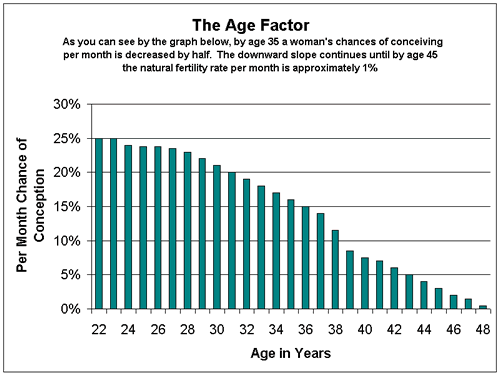Written by: Shannon McGrath, MSN, WHNP-C
In today’s society, age-related infertility is becoming common for a multitude of reasons. About 20% of U.S. women—a growing share—wait until after age 35 to begin their families, according to data compiled by the American Congress of Obstetricians and Gynecologists. Nationally, the mean age of first-time mothers was 25.4 years in 2010, up from 24.9 years a decade earlier, and up from and average of 21 in 1970, according to the latest data from the Centers for Disease Control and Prevention.
Even with significant advances in assisted-reproductive technology, or ART, a woman’s age can be a factor in getting pregnant. More women are pursuing fertility treatments, such as in vitro fertilization, using egg donors and freezing eggs and embryos, but the data shows that a healthy 30-year-old has about a 20% chance each month of getting pregnant, while a healthy 40-year-old has only around a 5% chance each month—in many cases, even when using ART.
Even though women today are healthier and taking better care of them-selves than ever before, this does not offset the natural age-related decline in fertility….in short, the biological clock does exist.
Unlike the early fertility decline seen in women, a man’s decrease in sperm characteristics occurs much later. Sperm quality can deteriorate somewhat as men get older as well as changes in sexual functioning but these changes are not as abrupt or noticeable as the changes in women.
Women at any age that want to know more about their fertility health are encouraged to speak with our physicians at Red Rock Fertility Center and know what their options are as well as time-line to address their desire for children, the optimal number, spacing and timing of children in the family and age-related changes in fertility. As part of a patient’s initial work-up and consultation, women are evaluated with blood tests, ultrasounds, and imaging procedures of their reproductive anatomy to determine their ovarian reserve and egg count. Patients are evaluated by checking their FSH, or Follicle Stimulating Hormone, which is responsible to stimulate a follicle to reach maturity and release an egg or ovulate. If the FSH level is elevated, it can be indicative of diminished ovarian reserve and thus more aggressive therapies might be offered to achieve a pregnancy. Additionally, another blood test that measures ovarian reserve is the so-called anti-Müllerian hormone, or AMH, level. The hormone is produced by the ovary in the process of forming a follicle and can give a general sense if a woman has a low, medium or high reserve of eggs. Genetics largely determine which women will still be fertile at 40 and which ones won’t but using the latest technology and the vast clinical and medical experiences of Dr Littman and Dr Severino, patients are given the best medical advice for their reproductive potential and success rates.




